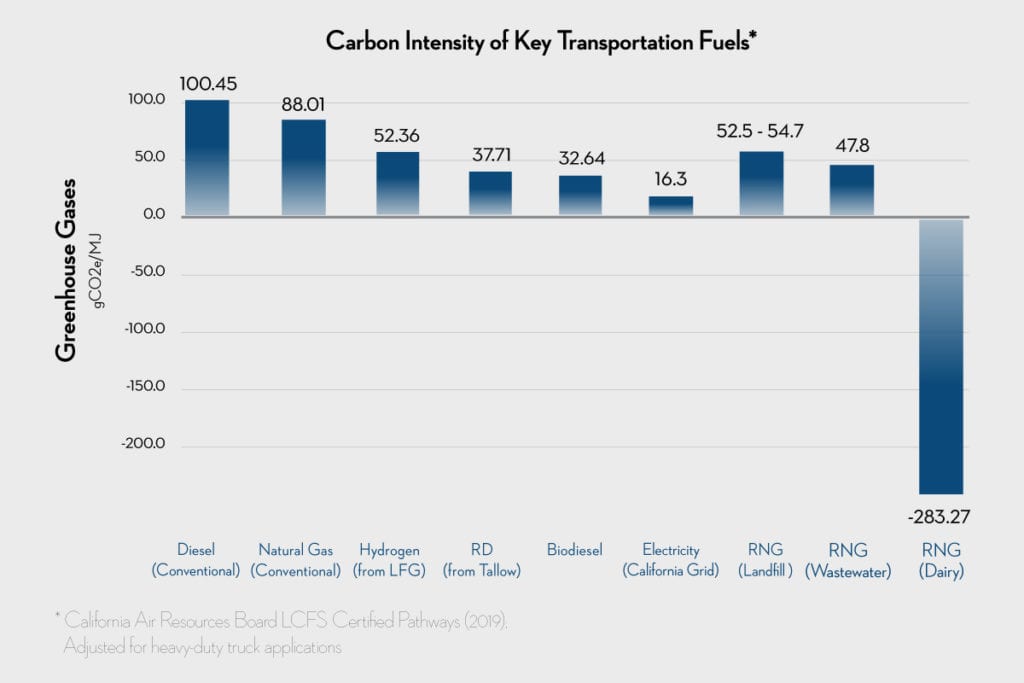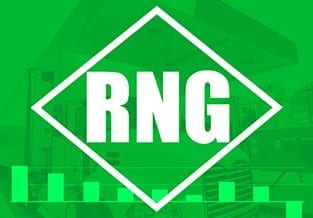Renewable natural gas is growing rapidly in the transportation fuel industry and decades of research confirms that it is a price-stable, low-carbon—and even carbon-negative—fuel option for fleets.
Sponsored By: Trillium

The attention surrounding the benefits of renewable natural gas (RNG) is for good reason. The fuel can deliver negative emissions at an extremely low cost to consumers. Anything that good makes one wonder whether the science backs the claims. The truth is the science and economics couldn’t be clearer. The best news: commercial fleets stand to benefit with a stable, price-competitive, and carbon-negative fuel.
Emissions Accounting Backed by Decades of Research
Expert sources, including the U.S. Department of Energy, U.S. EPA, California Air Resources Board (CARB), and respected institutions have spent decades measuring and documenting emissions from the industrial, agricultural and transport sectors of our economy. Today, standards including the Greenhouse Gas Protocol and those used by the federal government, measure emission flows in the same way that a business uses Generally Accepted Accounting Principles (GAAP) to measure cash flow. These standards have been adopted by regulators and businesses to identify which activities are the biggest emitters and have the most serious effects on human health and the climate—targeting them for reduction in the same way a CEO targets operational improvement for savings.
The Math is Right, Renewable Natural Gas Can Result in Negative GHG Emissions
If industrial activities create greenhouse gas (GHG) emissions, how can using RNG make those GHG emissions negative?
RNG is produced by capturing methane emitted from the breakdown of organic wastes in landfills, wastewater and farms. When methane emissions from these organic sources, which would have otherwise escaped into the environment, are instead captured, processed and converted into natural gas, they receive a credit for having not been released into the environment.
When RNG is recovered from dairy cow waste, it has a negative carbon intensity rating, meaning it takes more carbon out of the environment than it produces.
For instance, when RNG is recovered from dairy cow waste—a key source of climate-altering methane emissions—RNG has a negative carbon intensity rating, meaning it takes more carbon out of the environment than it produces. Below are the Carbon Intensity ratings of a range of transportation fuels, including RNG. A Carbon Intensity (CI) rating is the total measure of GHG emissions associated with producing, distributing and consuming a fuel. At -283 gCO2e/MJ, RNG sourced from dairy cow waste has the lowest Carbon Intensity rating of any fuel pathway as certified by CARB in 2019 and adjusted for heavy-duty truck applications.

A Carbon Intensity (CI) rating is the total measure of GHG emissions associated with producing, distributing and consuming a fuel.
Certified low-NOx natural gas trucks and buses are already 90% cleaner than the EPA’s current heavy-duty nitrogen oxides (NOx) emission standard using diesel fuel. NOx is monitored by the EPA due to its adverse effects on both localized air quality and public health. When fueled by RNG, a natural gas bus or truck’s NOx emissions reduction benefits are compounded even further with huge reductions in GHG emissions.
How Negative Emissions Produce Positive Economics
Federal and state-level government entities have regulated emissions for decades because of detrimental effects to human health and the environment. Fleet owners know these regulations very well through the extensive and costly maintenance, emissions-control equipment and certifications required to maintain their diesel fleets.
This market of buyers and sellers creates a monetary value for the environmental attributes of renewable fuels like RNG.
More recently, these government entities have introduced market-based programs allowing businesses to be rewarded for delivering low-carbon renewable fuels into the transportation system. The federal government created the Renewable Fuel Standard (RFS) which uses Renewable Identification Numbers (RINs) to identify carbon-reducing renewable transportation fuels. These fuels, when delivered into the transportation market, generate RINs which are sold to parties required to reduce the Carbon Intensity of their transportation fuels—the petroleum refiners.
This market of buyers and sellers creates a monetary value for the environmental attributes of renewable fuels like RNG. Other markets for renewable transportation fuels include California’s Low Carbon Fuel Standard (LCFS) and Oregon’s Clean Fuel Program (CFP). Proceeds from these credit markets are then reinvested in the business to grow the supply of renewable fuels and the refueling infrastructure that delivers it.
How Fleets Benefit from Renewable Fuels
By offering renewable fuels to fleets, Trillium can provide the emission benefits of carbon-negative fuels AND real cost savings for fleets.
Trillium and our fleet partners both benefit by implementing clean and renewable fuels. Trillium is prepared to offer RNG at any of our CNG stations or to any customer station, existing or yet to be built. By offering renewable fuels to fleets, Trillium can provide the emission benefits of carbon-negative fuels AND real cost savings for fleets.
To learn more about Trillium’s fueling solutions, visit www.loves.com/trillium.
__
About the Author:
Ashley Duplechien is Manager of Business Development at Trillium, a leading provider of alternative fueling solutions. Trillium designs, builds, owns, and operates a network of clean fueling stations across the US, serving on-road fleets that fuel with CNG/RNG, electricity, and hydrogen. Ashley is a skilled marketer and communicator with a particular focus on fueling infrastructure development and grant writing. As Manager of Business Development at Trillium, Ashley helps to ensure Trillium remains a trusted partner for fleets, providing customized clean-fueling solutions that meet fleets’ evolving needs.
Learn more about Trillium’s portfolio of fueling solutions visit www.loves.com/trillium or contact Ashley Duplechien at Ashley.Duplechien@trilliumcng.com


